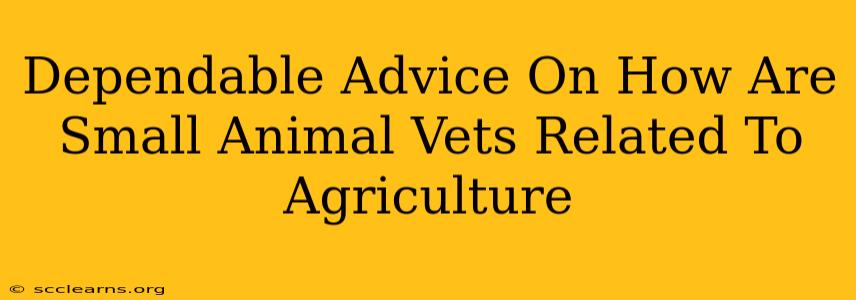Small animal veterinarians might seem worlds away from the farm, but the connection between their work and agriculture is surprisingly strong. While they primarily treat cats and dogs, their expertise intersects with agriculture in several crucial ways. Understanding these connections can provide valuable insights into the broader veterinary landscape and the importance of animal health in general.
Unexpected Overlaps: Small Animal Vets and Agriculture
The relationship isn't always direct, but the skills and knowledge of a small animal vet have surprising relevance to agriculture. Here's how:
1. Zoonotic Disease Prevention:
-
Shared Pathogens: Many diseases affecting small animals can also impact livestock and even humans. Rabies, leptospirosis, and certain parasites are prime examples. Small animal vets play a critical role in identifying and managing these zoonotic diseases, preventing outbreaks that could devastate agricultural populations. Their experience with disease surveillance and preventative measures benefits the agricultural sector significantly.
-
Public Health Implications: Understanding how diseases spread and are controlled in companion animals directly informs strategies for protecting agricultural animals and, ultimately, human health. This shared expertise is invaluable in protecting food security.
2. Pharmacology and Therapeutics:
-
Similar Medications: Many medications used in small animal practice have counterparts in veterinary medicine for larger animals. The knowledge gained from treating small animal patients provides a foundation for understanding drug interactions, dosages, and side effects in a broader context. This knowledge can be invaluable for veterinary professionals focusing on livestock.
-
Antibiotic Stewardship: The growing concern about antibiotic resistance affects both small and large animals. Small animal vets contribute to broader discussions and best practices for responsible antibiotic use, protecting both companion animal and agricultural animal health.
3. Veterinary Public Health:
-
Disease Surveillance and Reporting: Small animal practices often act as sentinels, reporting unusual disease patterns to public health authorities. This early detection system is crucial for preventing the spread of diseases that could impact both companion animals and agricultural livestock.
-
Community Education: Small animal vets engage in community outreach on issues like parasite control and responsible pet ownership. These educational initiatives often have indirect benefits for agriculture by promoting responsible animal husbandry practices that can prevent the spread of diseases to livestock.
4. Research and Development:
- Advances in Veterinary Medicine: Research conducted in small animal medicine frequently leads to breakthroughs applicable to other animal species, including livestock. This collaborative approach ensures ongoing advancements in animal health management techniques benefit both sectors.
The Broader Picture: Connecting the Dots
While not directly treating livestock, small animal vets contribute to a holistic approach to animal health within a community. Their role in disease prevention, responsible medication use, and public health initiatives ultimately benefits the agricultural sector by creating a healthier overall environment for all animals. This interconnectedness highlights the importance of collaboration and shared knowledge across different veterinary disciplines. The health of our companion animals is undeniably linked to the health of our food supply and the health of our communities.

